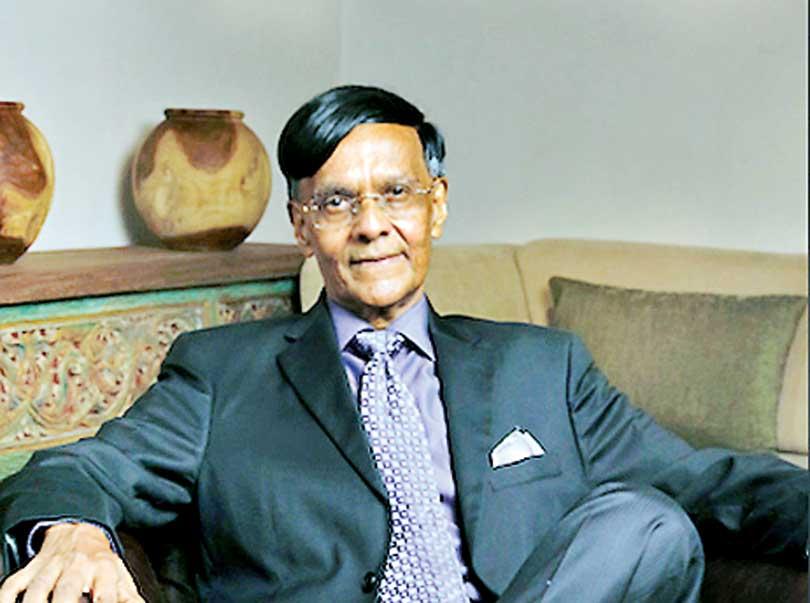Reply To:
Name - Reply Comment
Following is the second part of the interview with the Chairman of Presidential Expert Committee (PEC) on Sustainable Sri Lanka 2030 Vision, Professor Mohan Munasinghe. The first part was published on Tuesday. Prof. Munasinghe elaborated how Sustainable Sri Lanka 2030 Vision Report provides solutions for many burning issues in the country. He is a renowned physicist, academic and economist. He was also the Vice-Chair of the Inter-governmental Panel on Climate Change (IPCC) who shared the 2007 Nobel Peace Prize and has authored over 120 books and 400 papers. He is the Founding Chairman of Munasinghe Institute for Development (MIND) and MIND Group.

Q Enhancing the country’s agricultural base would address several issues faced by the country. Balance of trade imbalances, health, nourishment and poverty levels can all be addressed with a focused strategy for the agricultural sector. Should the country be encouraging its citizens to eat more vegetables, pulses and grains that grow freely in Sri Lanka as an alternative to meat? Is the meat and dairy industry contributing to the environmental damage and to what extent?
Your question is mainly on agriculture which is very critical for Sri Lanka. It requires a broad answer. We have discussed sustainable agriculture in the 2030 Vision report which is an answer to many key questions in areas including food security, malnutrition, health issues, poverty and inequality. There is an imbalance between the demand or the need for food and the availability of what we produce. The recommendations given in the report on sustainable agriculture by Dr. Anura Ekanayake and his team provide detailed answers.
The 2030 Vision also focuses on another aspect that you didn’t mention; marine resources. The Indian Ocean is the last frontier that Sri Lanka can develop sustainably because land resources are quite well-used. We have a lot of population to support on a small land area. We have many times in the same areas in our ocean boundaries as we have land area and these marine resources should be sustainably exploited. On livestock management, we have to keep in mind that the problem arises not just in the production of livestock, but also the way the waste is disposed of.
Q The report recommends creating more job opportunities for women and youth. What are the indirect benefits of this recommendation in creating a more sustainable country?
In uplifting the nation to a more sustainable status, we have to look at the growth dimension by providing skills and training for women and young people. It will automatically increase economic growth. Once they have job opportunities, they will produce more making them more inclusive to the workforce. Those who are unemployed should be given the support to find ways to get an income. The traditional role of women only in the home will subject to slight changes as the plan suggests how to get the productive potential and contribution of women also.
Last but not least since I am a very senior citizen, I would say that the elderly population should also be able to contribute to the process with their experience and expertise. With the changing population pyramid of Sri Lanka, there are more old people and fewer young people to support them. Therefore, the elderly should also be brought in to the process since this is a win-win situation.

Q The report suggests prevention of air pollution in major cities as a key environmental action recommendation. Is transportation the biggest contributor to pollution? What other factors should be considered when implementing this recommendation?
Yes, transport air pollution is most important in cities which do not have a sea breeze such as Kandy. Colombo is fortunate. The solutions, of course, can be achieved by introducing cleaner motor vehicles, making all motor vehicles to strictly follow the mandatory emission regulations. Secondly, we should move to cleaner technology, which is maybe more hybrid at least for public transport. We could go to electric or LNG buses. People might say it is very expensive for private cars, but you can certainly do it for public transport. We should also encourage more mass transport so that there will be less motor cars with just one driver sitting and going to work. We can have electronification of railways. As I said, there are many solutions that can be done on the transport side.
I will give you an example. There is a city called Shenzhen in China where I’m an advisor for sustainable development. The population of Shenzhen in China is 21 million which is almost the size of Sri Lanka. The city is the Silicon Valley of China; with the most advanced technology. All the public buses and taxis are electric by law. China is not a very rich country like the USA. I’m not suggesting that in Sri Lanka we can have all the all-electric vehicles. But, we can start to move in that direction.
Recently in the budget, they imposed a heavy tax on the import of electric vehicles which caused a huge outcry. It is not the type of disincentives that the government should provide. They have to incentivise people so that they will move towards cleaner fuels particularly in transport.
Q In the key environmental action recommendations a participatory approach to increase forest cover is discussed. Can you please elaborate on what kind of participatory approach is required?
One of the principles in the BIGG Path is the cooperation of all stakeholders. When it comes to cutting trees, participatory means that the very people who cut trees and get bribes can be taught that if they protect and manage forests they will be able to earn even more money. There are now tree planting programmes which are being tried by social entrepreneurs. It is not necessarily driven only by the government, but also the private sector.
Another main aspect is carbon. The whole world is struggling to reduce the carbon which is causing global climate change and global warming and they are even ready to pay for those who plant forests in order to absorb carbon. We have to make buffer zones around all the forests to protect them. It also protects animal wildlife through which activities like tourism can also be helped.
Q Waste disposal and reducing water pollution are other key environmental action recommendations in the report. This would be impossible with the absence of a structured and effective recycling system for waste. What would be the most efficient process to get a recycling system in place for the country?
I think the best way of controlling pollution is to strictly enforce the existing laws. If the garbage was properly collected and disposed of according to the laws, we don’t need new advanced technology. It is not rocket science, right? The recycling and reuse processes are very well known and are relatively simple. If the waste is managed properly, we can eliminate the dengue problem. Using technology, we can convert waste into energy and we can convert bio waste into fertiliser.
What is important here are incentives. People should be encouraged to do the right thing. On the other hand, when they violate rules and regulations, they should be punished too as per laws. Those who take the environment for granted should be named, shamed and penalised so that they would not be able to get away with it even after doing public damage.
Technical advice is also very important. In rural areas, there are many people using traditional methods of waste disposal (burning waste and producing smoke) which are no longer good for them or the environment. People should be given technical knowledge on new ways of waste management which benefit all related parties.
Q Replacing fossil fuel with more renewable energy options is suggested. But recently the Minister for Power and Energy discouraged householders from installing solar panels and selling excess electricity to the CEB. There are plans for more coal power plants. Would this decision push back the timeline for the successful implementation of the vision for 2030?
In Sri Lanka, we have very high electricity tariffs. However, power reliability is also quite good when compared to neighbouring countries where there are frequent power failures. The problem is not whether we should or should not encourage solar power. The problem lies in the pricing of electricity. There are methods to restructure the pricing of electricity. In technical jargon, they are called ‘prosumers’ (producers and consumers) who use their own solar panels at home still obtaining power from the grid. Solar panels should definitely be encouraged at the household level. The way the electricity pricing has been done in Sri Lanka is completely distorting. It can be solved.

Q You explained very well about the report. There have been many reports like these formed by experts in the country. My question for you is whether you have the confidence in the much-corrupted system that it would implement these recommendations? What is your opinion about the political support for this type of work?
That is exactly why I told you that there is an unsustainable triangle driven by wrong values which include corruption, greed, violence, selfishness and so on. Recently I attended a World Children’s Day celebration in a leading school in Colombo as the chief guest. This is the point I emphasised to the audience. Unless we start with these young people, we are never going to achieve a sustainable society. More importantly, we as elders must set the right example.
The corruption situation in Sri Lanka is not unique. There are many reports like these in many parts of the world, but very little implementation. As I said, we have many existing rules and regulations in Sri Lanka. If we had implemented them properly, this country would have been a paradise. Nevertheless, the laws are not enforced and the plans were not properly followed. Therefore implementation is very important.
I think we can turn this situation around because when things get really bad, people start to worry. In the Rathupaswala incident, people took to the streets when they realised they didn’t have water to drink. But, we do not have to wait until a point where things turn so bad where violence might erupt.
As we can see, we are at the edge of a cliff. We can save ourselves before we fall off the cliff. The 2030 Vision has a special chapter with the opinions of young people in the twenties and thirties. Everybody else in the expert panel is over 50 years old. Maybe we would not be there by 2030 and beyond.
We will be facing a period where there will be changes in the government. We would like to urge whoever comes into power to begin implementing the recommendations given in our report and to live up to their promises.
Moreover, there are so many good examples and best practices in many countries that we can learn from. All you need to do is go to the internet and do some research. The 2030 Vision report is also published in all three national languages, making it accessible to everyone. I should also emphasise the role and responsibility of the Sri Lankan media to give due attention and airtime for serious issues like these and bring them into focus. I congratulate you for doing this particular series.